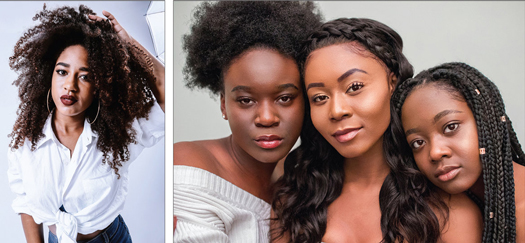By Charlene Muhammad CHARLENEM

LOS ANGELES–A bill to end discrimination against persons who wear natural hair styles in schools and the work place is making progress in California. Democratic State Senator Holly Mitchell proposed Senate Bill 188 the CROWN (Creating a Respectful and Open Workplace for Natural hair) Act to create peaceful and respectful places for people who dawn natural hair in the workplace. Her colleagues agreed with a unanimous 37-0 vote on April 22.
The bill has not been scheduled for a hearing date in the California Assembly yet, and also is awaiting referral to a committee. Jorge Barajas, a legislative aide to Sen. Mitchell, told The Final Call that may occur sometime in late May or mid-June.
Part of her aim is to help educate and dispel myths about the unique quality of Black hair, its texture, and the Black hair experience, said Sen. Mitchell. Another is to challenge commonly held myths about what constitutes professionalism in the workplace.
“Until very recently, a Google image search for ‘unprofessional’ hair styles yielded only pictures of Black women with their natural hair or wearing braids or twists,” said Sen. Mitchell before the vote.
“Although disheartening, this fact was not very surprising. Eurocentric standards of beauty have established the very underpinnings of what was acceptable and attractive in the media, in academic settings and in the workplace,” Sen. Mitchell stated.

She said that even though Blacks were no longer excluded from the work place, their features and mannerisms remained unacceptable and “unprofessional.”
“For centuries, Black people had no choice but to conform to harsh and expensive standards to change their natural appearance. Some people believe that this is an issue of the past, that we’re beyond outright discrimination based on appearance,” said Sen. Mitchell, adding, “and some, quite frankly, aren’t sure that this is an issue at all.”
The CROWN Act, sponsored by the National Urban League, Dove, Color of Change and Western Center on Law & Poverty, corrects an inconsistency in existing anti-discrimination laws by amending the California Government and Education Codes to protect against discrimination based on traits historically associated with race such as hair texture and protective hairstyles.
Until recent decades, Sen. Mitchell said, Black men and women did not often challenge such standards, but donned wigs, straightened their hair, or used harsh chemical relaxers, such as strenuous, difficult and dangerous conks made from lye to adapt. Conks were worn by Black men in the early to mid-1920s.
The CROWN Act notes that while anti-discrimination laws presently protect the choice to wear an afro, afros are not the only natural presentation of Black hair.
There are far too many cases of Black employees and applicants denied employment or promotion and even terminated because of their hair choices, despite federal and state law protecting individuals from discrimination based on religious hair styles and head coverings, stated Sen. Mitchell.
She has heard far too many reports of Black children humiliated and dismissed from school because their natural hair was deemed unruly or a distraction to others, she continued.
“Can we truly say that equity exists when our children are denied the right to learn in class because of the characteristics of their hair? Where is the justice when Black men and women are denied access to economic advancement because of their natural appearance? Braids, twists and locs should also be my protected right to choose,” said Sen. Mitchell.
She argued that opponents feel the bill will result in frivolous claims that will burden employers or prevent employers from requiring workers to wear protective covering or hair nets, but that’s not true.
By clarifying that hair texture and hair styles are tied to racial identity, the CROWN Act actually helps make employers aware of historically excluded traits. It also helps them create grooming policies that will foster inclusion and diversity, she said.
“I believe that any law, policy or practice that sanctions a job description that immediately excludes me from a position, not because of my capacity or capabilities, or my experience, but because of my hair style choice is long overdue for reform,” said Sen. Mitchell.
Janette Robinson Flint, executive director of the Los Angeles-based advocacy organization Black Women for Wellness, emphasized that the bill’s sponsors, not Sen. Mitchell, but the National Urban League and Dove and Western Center for Law & Poverty must advocate and talk to Assembly members, and present letters of support from community-based organizations and Black women impacted in very real ways.
“I think that the work has to be done, that it’s not a slam dunk in that regard, because a lot of people don’t want to admit out loud their implicit bias or admit out loud their racism, and that’s where the work has to come in to make sure that all the Assembly people are well aware of what the issue is and the challenges and the impact that it’s had on lives,” Ms. Robinson Flint told The Final Call.
She supports the bill, because she’s been wearing a natural hairstyle for the last 30 years and has personally experienced ways in which discrimination happens in both subtle and overt ways, particularly in government.
“I remember one time going to city hall with a group of primarily Black women and I was the only one with my hair natural or in a natural style, and I was the only one that had to go through two levels of security, and I’m talking City Hall here. Los Angeles City Hall! So, that’s ridiculous,” said Ms. Robinson Flint.












